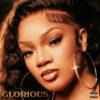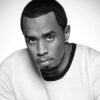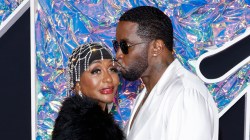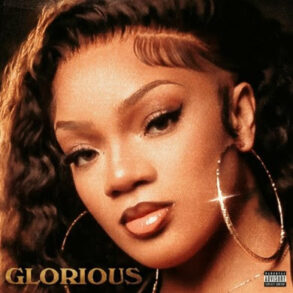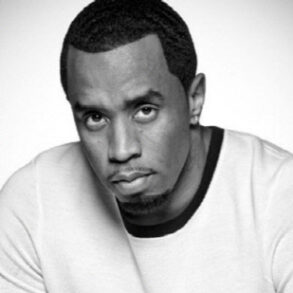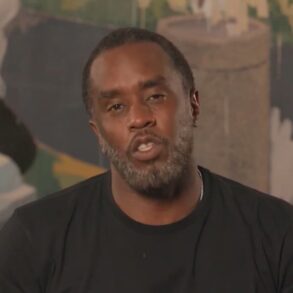Roxanne Shanté has lived with hip-hop for longer than many fans of the culture have been alive. She’s also been one of the greatest ambassadors with one of the best stories.
The legendary Queensbridge emcee got her major start in music in ‘84 when Juice Crew’s DJ Marley Marl knew her by reputation and approached her in the neighborhood one day. A preeminent battle rapper, Shanté eventually attained stardom, with her story eventually illuminated in the 2017 film Roxanne Roxanne.
Currently, Roxanne hosts Sirius XM’s Have A Nice Day on Rock The Bells Radio, where she and co-host DJ Cool V crack jokes and play music they love. She also performed at LL Cool J’s Rock The Bells festival last weekend and will do the same at the Hip-Hop 50 Live event at Yankee’s Stadium on Friday (August 11) in honor of the 50th birthday of hip-hop.
Roxanne Shanté sat down with BET to discuss her influence in hip-hop, but also about women in the culture, their struggles, triumphs, and how they’re running things as of late. She also provides insight into the next half-century and what she believes is in store for the culture she helped evolve. Read below.
BET: Take me back to the mid-’80s and 12th Street and meeting Marley Marl and sort of that initial part of your career…
Roxanne Shanté: When we go back to that part of my career, especially when we go back to meeting Marley Marl – I’ve known DJ Marley Marl my entire life, literally. Growing up in Queensbridge public housing, he was my neighbor and he was considered one of the big brothers on the block. But he was also a great, great producer, and I remember going to the laundromat and happened to look up and hearing him call me out the window and giving me that opportunity like, “Listen, I heard that you can rhyme.” And me being quick-witted and also a sassy mouth as always, I was like, No, you know that I can rhyme. And he was like, “Okay, okay, well, I need you to come and do this for me.” And so that’s how I was able to make my first record, and I did that as a freestyle. So it took me about seven minutes, I want to say seven minutes of freestyling but in total, maybe about 10 minutes to make “Roxanne’s Revenge.”
BET: What was Queensbridge like during the 1980s if you were to describe it to someone who wouldn’t know?
Roxanne: Queensbridge just like every other neighborhood, it was great. It was a great time. When you’re talking about people, everybody has their own ideas of what they consider to be a great time. But when you’re talking about Queensbridge, you’re talking about it being very musical, you’re talking about everyone being around and coming out and being a huge family. So if I had to sum it up, I would definitely say it was just a huge family.
BET: What was a moment for you in hip-hop back then that made you smile with pride for your neighborhood or even Queens in general?
Roxanne: Everyone says that hip-hop started in The Bronx, and I’m sure that there are a lot of people who would contest that because everybody has their own beginnings, everything in the world. So for us, even if they were to say that hip-hop started in the Bronx, we can definitely say that Queens perfected it. When you’re looking at artists such as LL Cool J, and what we do now with Sirius XM, that’s showing those showing the steps of perfecting hip-hop and making sure that it’s presented properly. When you’re talking about groups like Run-D.M.C., and taking hip-hop to places that it had never been. Then you got to look at Queens and say Queens took hip-hop to places in heights that had never been when you look at the success of 50 Cent – now especially with the television series and all the things that he is doing now as far as media [is concerned]. You got to say, Okay, you know what, Queens definitely has taken it to that place. So, and even when it comes to biopics, and you’re looking at women with their own stories, you look at Roxanne Roxanne and the success of Roxanne Roxanne being a movie that we shot directly in Queensbridge public housing with a majority of the actors being from Queensbridge – you can say like, Oh, Queens has done it again. So I take a lot of pride in being from Queens, but I also understand that sometimes when you think of hip-hop, the first thing you do is think about Bronx, but when you think about perfecting it, you truly need to think about Queens.
BET: Oh trust me, I got my Queens exposure last weekend at Rock The Bells. Loved every moment of it and you could tell how special that borough is to the people there and the culture…
Roxanne: Let me tell you that’s a beautiful thing. And right now, with the way you’re feeling that you had that right there, that’s 80s hip-hop. That’s what you’re feeling with the smile on your face and the wiping your brow and you just can’t seem to get the right words to describe it. So for me to let you know what that is that right there, that is 80s Queens hip-hop. That’s what you’re feeling right there. And that is something that I am so proud to be a part of coming from, you know, LL Cool J’s Rock The Bells Radio. That’s the feeling that we try to give everybody every day here from Sirius XM.
BET: How big was MC Sha-Rock for you when you started to rap, even if many consider you one of the first female emcees in your own right?
Roxanne: Absolutely, she’s definitely a guiding light. She was definitely an inspiration to so many female rappers. When you think about Sha-Rock, you think about more than just the Funky 4 + 1. Now I have the honor of being able to say she’s my Sirius XM sister also. So I get a chance to truly interact with her a lot more than I ever did. I smile because when people ask me about hip-hop, and especially in the beginnings of hip-hop, they need to take into consideration that it started in ‘73. I was three. I don’t think people see that. I think they think like you was a bad three-year-old, us up there in a party or club. But that’s also an honor for me, for people to associate me and identify me with the very beginnings of it. That lets me know that I have definitely made my mark in this great thing that they call hip-hop.
When I think about Sha-Rock and I think about Pebblee Poo, and I think about the Dimples D. and the Us Girls, the main thing I say is like that’s that generation right before me that allowed me to be able to do what I do so well. I moreso was surrounded by men, like my competition was always men. My counterparts on stage were always men. So it was a little different when I came along. I think this was at a time where people still felt that you had to outgrow hip-hop in order to become an adult. And I think maybe some of the women felt that way. Also, they felt that now they’re going to become mothers or it was time for them to get a real job, and it was time for them to do all of these things. So there weren’t too many around for me to say, Okay, I want to be like her. I want to do that. But I did get a chance to hear them. So for me, Sha-Rock definitely was the beginning.
BET: One thing you’ve said in the past stuck with me was when you noted that you lost some love for hip-hop when you were cheated out of beating Busy Bee Starski for “best freestyle rapper” back in the day. You later found out years later that Kurtis Blow gave you that low score because he believed hip-hop needed a male to be at its forefront to grow as a business. You’re now all good with him, but how did that all play out at that time?
Roxanne: Well, what it did was it definitely showed me that hip-hop was starting to change and it was becoming a business. It wasn’t just a quote-unquote neighborhood sport any longer. It wasn’t something that we go to the parks and see who’s the best and whoever’s the best beats the best. Now we understood that it was more so getting into the music business, and there was going to be a business side of it. That’s what I really learned from that day. I didn’t learn as far as they were going to be better than me or maybe these emcees happened to be around longer than me, because I never felt that way. I always felt like look, I’m the best. And in order to be the best you must beat the best and I felt like I had beat the best so therefore you should title me. But as years went on, I understood that sacrifice and I wasn’t angry about it.
Would that have changed Roxanne Shanté’s life? Absolutely. Because at a point of something that you are so great at and I’m sure there’s other people who are able to identify with this: something that you’re so great at but people won’t acknowledge your greatness. Of course, it can change your life, but it never changed the way I felt about me.
BET: Women run hip-hop right now. Seeing all their talent shine bright, what does that mean to you as one of the literal pioneers of being a woman on the mic?
Roxanne: I love it because it represents to me everything that I fought for every time I climbed up on the stage and snatched the mic, or went through a little tussle, or just to prove a point that women could also rap, if not better than, but just as well as men. So it showed me that all of my hard work in the beginning has truly paid off now. When I see my hip-hop sisters doing the things that they’re doing now – even taking care of their business the way they are and being able to maintain their careers and their family life – a lot of [those] things that were looked upon and shunned when we were younger, like having babies. But now seeing them being open – like, Look, we’re women and we can do all of these things. It just shows me the strength of women.
It also shows me how the world has shifted. So now it understands where a lot of the strength has come from because we wouldn’t have hip-hop if it wasn’t for women. It was somebody’s mother that allowed somebody to plug in. It turns out they were scratching somebody’s records, they were doing these things. The party started in somebody’s house. So So because of that, it’s an honor for me to see where my hip-hop sisters have taken it. And I can only sit back and imagine where else they’re gonna go.
BET: What differences or challenges do you see between being a woman in hip-hop during the 80s and 90s and now?
Roxanne: Well, for me, I came in differently, I came into the industry literally from just doing my laundry, so I never sought out a career in hip-hop. When it comes to making demos and going out and looking for a record deal, I never went and looked for a record deal. Record deals just found me. So it’s hard for me to be able to say what the difference is now, but I just know from being in that room and seeing what a lot of women went through, I know that now having the knowledge that they have and having the ability to be able to do things independently, is definitely a great thing for women in the industry now. All of the things that they may have felt they needed to sacrifice, all the things they may have had to do that were very uncomfortable for them. Now, you can just load up your laptop, record in your house, post it up, let the people see it go out on your own time, and be able to do that.
So I think there’s less for them for people to tell them to do and it’s more for them to give instruction to themselves. I think it has definitely put female artists in a safer place. As far as I’m concerned being a young woman who was once watching people go through what they went through in the industry, I see that now it’s definitely put women in a more creative space, more of a place of ownership, but it’s also put them in a safer space. You don’t have to go to the studio at 2 a.m. when you could just plug your computer in and do it yourself. You don’t have to be in the studio with a whole bunch of men and everybody’s drinking and smoking and you trying to wait your turn or you want to prove your point or that you deserve to be in that room. Now, you can literally be in that room without being in that room.
BET: You host Have A Nice Day on Rock The Bells Radio on Sirius XM weekdays at 4 p.m., and it’s been going since 2018. What kind of joy has that brought you – because not only is it a job and can be fun, but I feel like it’s another way you push hip-hop forward.
Roxanne: When I was first approached about it, and I was doing an interview with LL, and he was interviewing me about my movie, Roxanne Roxanne he said we laughed so much. And he just said, “People need to have this type of laughter every day, I’m gonna make this happen. And not only that, you do it for the culture, you know the records, let’s make this happen.” And so he made it happen. I remember my first day being inside of the studio, and I was saying, “Okay, well, I know, I’m gonna get fired today because my language the way I am, I’m very open, I don’t know how to change.” The first thing he told me was, just be you. And here we are five years later, 7 million listeners still being me and I think it’s a wonderful thing. Being able to work side by side with the people that you love and respect.
BET: Earlier, you mentioned that hip-hop was often considered a fad when you were coming up. But we know now that that was way off and you’ll be performing at Yankee Stadium on Friday for the 50th anniversary. What do you hope to see out of the culture in the next 50 years?
Roxanne: When you think about the next 50 years of hip-hop, you think about the level of creativity. The artists are in such a great position now because knowledge is everywhere. So I think in the next 50 years of hip-hop, we’re going to see a lot more ownership, we’re going to see a lot more creativity, and we’re definitely going to see a lot more hip-hop.


